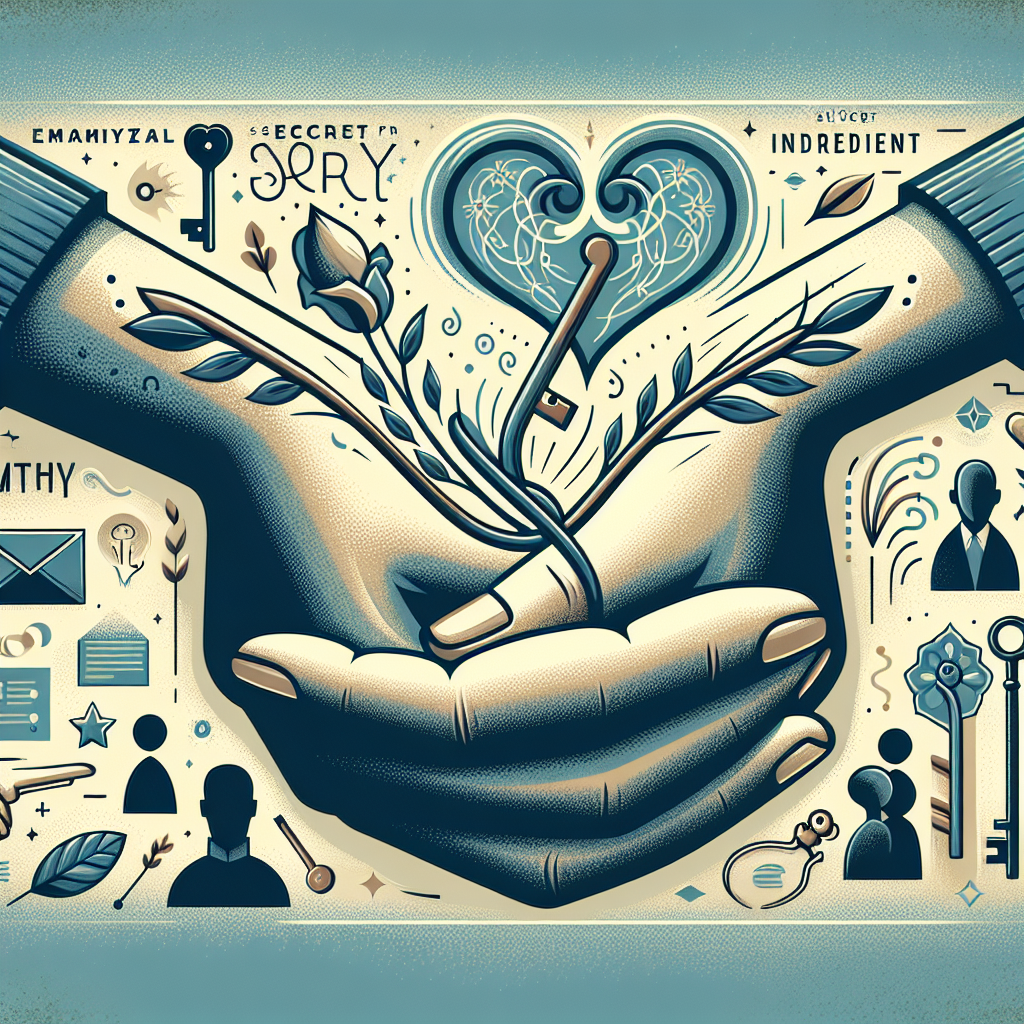
Empathy: The Essential Ingredient for Lasting Relationships
Introduction
In a world that often feels divided, where misunderstandings can escalate into conflict and isolation lurks around every corner, empathy emerges as the ultimate antidote. It is the secret ingredient for lasting relationships, whether personal or professional. As we navigate the complexities of human connections, understanding and sharing the feelings of others is paramount. Empathy enriches our interactions, fosters trust, and creates a profound sense of belonging.
But what exactly is empathy, and why is it so crucial in forging enduring bonds? This article will delve into the transformative power of empathy, offering valuable insights that will not only deepen your understanding but also enhance your relationships. By the end of this journey, you will see how empathy can be your greatest ally in building connections that stand the test of time.
Understanding Empathy
Defining Empathy
Empathy is often confused with sympathy, but the two are fundamentally different. While sympathy involves feeling pity for someone’s situation, empathy involves putting yourself in their shoes—experiencing their emotions and perspectives as if they were your own. According to psychologist Brené Brown, empathy is the ability to connect with others’ feelings without the burden of judgment. This deep emotional resonance becomes a vital foundation upon which meaningful relationships are built.
The Components of Empathy
To fully grasp empathy’s power, we should break it down into its three main components:
Cognitive Empathy: This involves understanding another person’s thoughts and beliefs. It allows us to see a situation from their perspective, which is crucial for effective communication.
Emotional Empathy: This is the ability to share and understand the emotions of others. It often manifests in compassionate responses to another person’s feelings, allowing for deeper emotional connections.
- Compassionate Empathy: This aspect includes not only understanding and sharing feelings but also feeling compelled to act on that understanding. Compassionate empathy is often what drives people to help others, reinforcing the bonds between them.
The Role of Empathy in Relationships
Building Trust and Connection
Trust is the cornerstone of any relationship, be it personal or professional, and empathy is essential for building and maintaining that trust. When individuals feel understood and validated in their emotions, they are more likely to open up and share their thoughts, needs, and vulnerabilities. This mutual exchange cultivates an environment where trust can flourish.
Consider a simple case study of a couple navigated through a challenging time. When one partner faces a setback—say, job loss—the other partner who responds with empathy listens intently, recognizes the emotional turmoil, and offers support without jumping to solutions. This approach not only strengthens their emotional bond but also reinforces trust as they face challenges together.
Conflict Resolution
Conflicts are an inevitable part of any relationship, but how they are handled can make or break the connection. Empathy serves as a powerful tool in conflict resolution. When individuals can empathize with one another, they are better equipped to step away from their own perspectives and understand the motivations and feelings behind the other person’s actions.
For instance, in a workplace scenario, two co-workers might clash over differing opinions during a project. By approaching the disagreement with empathy, both parties can articulate their feelings and concerns more appropriately, leading to a mutually beneficial resolution. This not only resolves the conflict but enhances collaboration and respect moving forward.
Enhancing Communication
Communication is the lifeblood of relationships, and empathy plays a pivotal role in ensuring that communication is effective and engaging. When empathy is present in conversations, individuals feel heard, valued, and understood. They are more likely to express themselves openly and honestly, leading to deeper dialogues.
To see this in action, let’s look at a case study featuring a teacher and a student. A student struggles with a topic and feels embarrassed to ask questions. The teacher, demonstrating empathy, creates a supportive environment where the student feels safe to express their difficulties. This simple act of empathy not only improves the student’s learning experience but also establishes a relationship of respect and trust.
Fostering Emotional Resilience
Empathy contributes to emotional resilience in relationships by promoting understanding and support during tough times. When partners in a relationship show empathy towards each other’s struggles, it fosters a sense of security. This support is crucial during challenging periods, as individuals know they have someone who understands their feelings and is there for them.
A poignant example can be found in the experiences of caregivers. Caregiving can be emotionally draining, and those who receive empathy from family members or friends can better cope with the stress. By simply understanding the pressures a caregiver faces, loved ones can offer the necessary support, which strengthens familial bonds.
The Impact of Empathy on Personal Relationships
Romantic Relationships
Empathy serves as the bedrock of healthy romantic relationships. Couples who practice empathy often exhibit higher levels of relationship satisfaction. By actively listening to each other and validating emotions, partners can navigate conflicts more effectively and build a resilient bond that endures.
For instance, a study conducted by the University of California, Berkeley found that couples who expressed empathy had stronger marital satisfaction and stability over time. When one partner is upset, the other’s empathic response can provide comfort and understanding, reaffirming their commitment to one another.
Friendships
In friendships, empathy enhances our ability to connect and communicate. Friends who can empathize with one another’s highs and lows are more likely to nurture a strong and lasting bond. This connection is often what helps friends weather life’s ups and downs together.
A relevant case study can be seen in long-term friendships where one friend faces significant life changes, such as a divorce or career shift. The friend who offers empathetic understanding becomes a crucial source of support, ensuring the relationship not only survives but flourishes during challenging times.
Familial Bonds
Empathy enriches family dynamics, creating understanding and support within family units. Parents who exhibit empathy towards their children can foster a nurturing environment that encourages open communication. This leads to healthier parent-child relationships and emotional well-being for both parties.
For example, a case study involving parents of teenagers showed that those who practiced empathy were more effective in resolving conflicts and understanding their children’s needs. By recognizing their teenager’s emotions during turbulent years, parents created a more harmonious home environment.
The Impact of Empathy in Professional Relationships
Workplace Culture
In the professional realm, empathy fuels collaboration, innovation, and a positive workplace culture. Empathetic leaders tend to inspire greater loyalty and commitment from team members. When employees feel valued and understood, job satisfaction and productivity increase.
A comprehensive study from the Center for Creative Leadership revealed that companies with empathetic leadership outperformed their competitors. Leaders who prioritize empathy create a culture of support, leading to higher employee retention and engagement.
Team Dynamics
Within teams, empathy fosters collaboration and enhances communication, leading to better performance outcomes. Teams that practice empathy are more likely to approach challenges collectively and find creative solutions.
Let’s consider a case study involving a tech development team facing tight deadlines. When team members practice empathy, they respect each other’s workloads and challenges, leading to cooperative problem-solving rather than competition. This approach enhances team unity and net results.
Client Relationships
Empathy is equally crucial in client relationships. Understanding client needs and emotions fosters stronger connections and can lead to loyal partnerships. Businesses that emphasize empathy in their customer service approach set themselves apart in competitive markets.
Take, for example, a customer service department that trains employees in empathetic communication. By understanding customer frustrations and responding with compassion, the department can improve client satisfaction, leading to long-term brand loyalty.
Building Empathy Skills
Active Listening
One of the most effective ways to enhance empathy is through active listening. This means fully concentrating on what the other person is saying, understanding their message, and responding thoughtfully. Avoid interrupting or formulating responses while the other person is speaking; instead, focus on their emotions and perspective.
Practicing Mindfulness
Mindfulness can also cultivate empathy. Being present in the moment allows us to better understand our own feelings and the feelings of those around us. Mindfulness practices such as meditation can enhance our emotional awareness, improving our ability to empathize.
Seeking Diverse Perspectives
To develop empathy, it’s essential to expose ourselves to diverse experiences and viewpoints. Engaging with people from different backgrounds can deepen our understanding of various emotional landscapes, fostering a more comprehensive empathetic approach.
Open-Mindedness
Maintaining an open mind encourages empathy. Accept that everyone has different experiences and feelings; resisting judgment allows for better emotional connections.
Reinforcing Emotional Vocabulary
Expanding our emotional vocabulary can significantly enhance our empathic responses. Learning to articulate feelings not only helps us express ourselves better but also allows us to understand others more clearly.
Conclusion
Empathy: The Secret Ingredient for Lasting Relationships is a profound truth that we should strive to integrate into all areas of our lives. By cultivating empathy, we strengthen relationships, foster trust, and build resilient connections that withstand the test of time. Whether in our romantic lives, friendships, or professional environments, the practice of empathy enhances communication, resolves conflicts, and fosters emotional resilience.
As you ponder the role of empathy in your life, consider actionable steps to incorporate its principles into your relationships. Commit to active listening, embrace open-mindedness, and seek to understand not just the words, but the emotions behind them. In doing so, you will unlock the transformative power of empathy, creating bonds that are not just enduring but enriching for all involved.
FAQs
1. What is the difference between empathy and sympathy?
Empathy involves understanding and actively engaging with someone else’s feelings, while sympathy is feeling pity or sorrow for someone’s situation without necessarily sharing their emotional experience.
2. How can I become more empathetic?
You can become more empathetic by practicing active listening, being open-minded, seeking diverse perspectives, and expanding your emotional vocabulary.
3. Is empathy important in professional settings?
Yes, empathy is crucial in professional settings as it enhances teamwork, improves communication, and fosters a positive workplace culture, ultimately increasing job satisfaction and productivity.
4. Can empathy be learned or developed?
Absolutely! While some individuals may have a natural inclination toward empathy, it can be developed through practice, mindfulness, and intentional reflection on one’s interactions with others.
5. How can empathy improve my relationships?
Empathy improves relationships by fostering trust, enhancing communication, resolving conflicts effectively, and creating a supportive environment where emotional resilience can thrive.
Incorporating empathy into your daily interactions can lead to deeper connections and more fulfilling relationships, making it an essential ingredient for a meaningful life.















